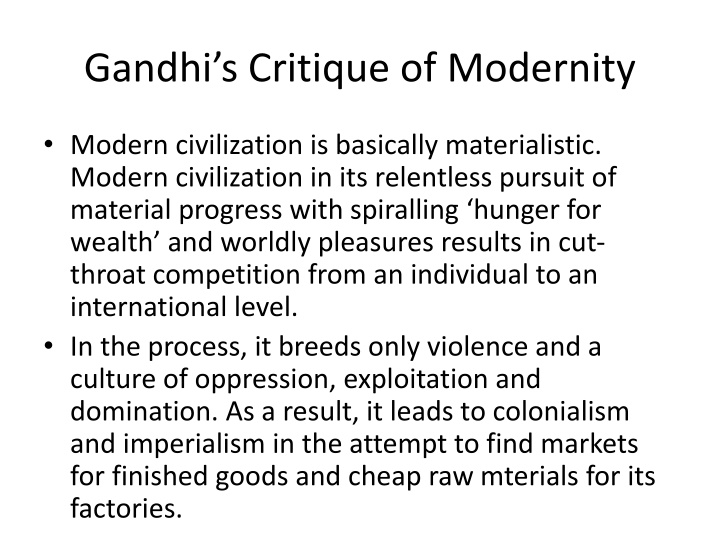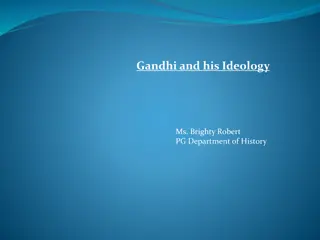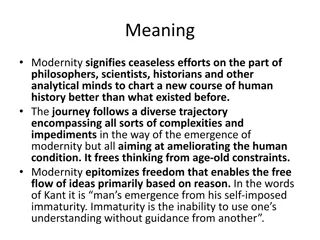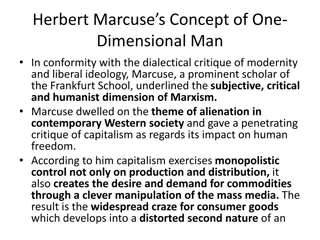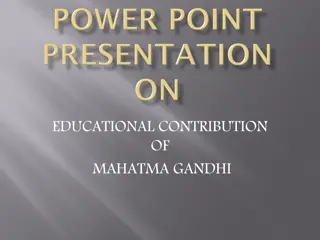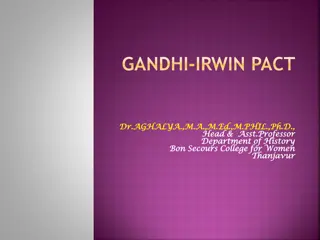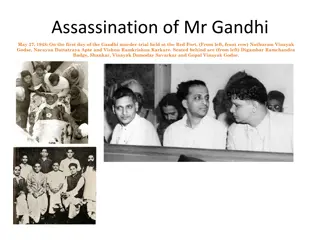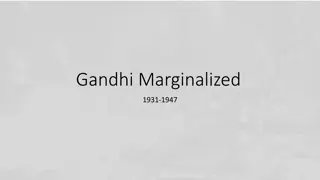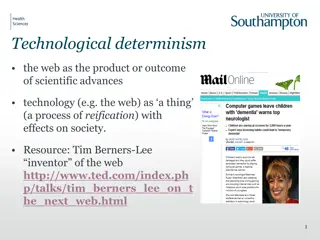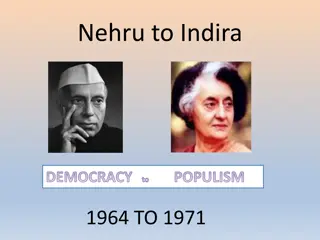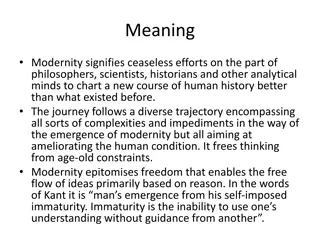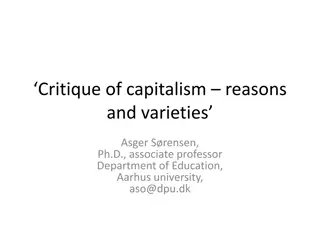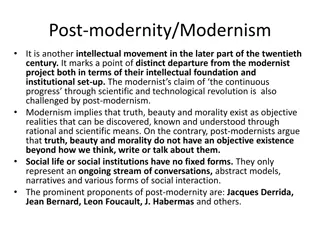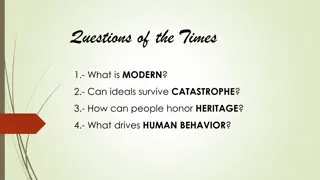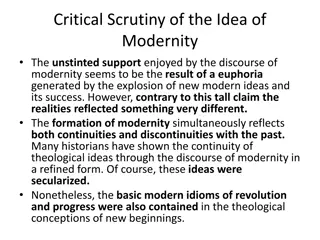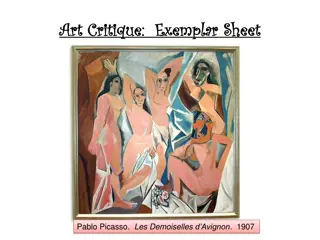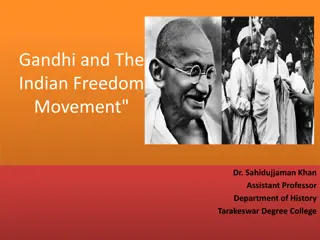Gandhi's Critique of Modernity: A Thoughtful Analysis
Gandhi's critique of modern civilization delves into the materialistic nature of modernity, highlighting its detrimental effects on society, individuals, and the environment. He argues that relentless pursuit of wealth and worldly pleasures leads to violence, exploitation, and domination, resulting in colonialism, imperialism, and the degradation of moral values. The emergence of an elite self-serving group further exacerbates societal issues. Gandhi's evaluation encourages a deeper understanding of the complexity of the relationship between tradition and modernity in society.
Download Presentation

Please find below an Image/Link to download the presentation.
The content on the website is provided AS IS for your information and personal use only. It may not be sold, licensed, or shared on other websites without obtaining consent from the author.If you encounter any issues during the download, it is possible that the publisher has removed the file from their server.
You are allowed to download the files provided on this website for personal or commercial use, subject to the condition that they are used lawfully. All files are the property of their respective owners.
The content on the website is provided AS IS for your information and personal use only. It may not be sold, licensed, or shared on other websites without obtaining consent from the author.
E N D
Presentation Transcript
Gandhis Critique of Modernity Modern civilization is basically materialistic. Modern civilization in its relentless pursuit of material progress with spiralling hunger for wealth and worldly pleasures results in cut- throat competition from an individual to an international level. In the process, it breeds only violence and a culture of oppression, exploitation and domination. As a result, it leads to colonialism and imperialism in the attempt to find markets for finished goods and cheap raw mterials for its factories.
Individual Level At the individual level, it promotes a concept of the egocentric man, ever engaged in the task of finding new avenues for enhancing his possessions and pleasures. Such a naked pursuit of self-interest makes all talks of religion and morality irrelevant, which is why modern civilization becomes devoid of religion, morality and spirituality. It also promotes extreme individualism leading to the emergence of atomised individuals deprived of the warmth of his community life.
Against Nature The much celebrated scientific and technological revolution has resulted in the rape of nature posing a serious threat to the very existence of humankind. Large scale industrialization and urbanization in a senseless and imbalance way with the means of rapid transportation and communications has uprooted a large number of people from their original habitats causing untold miseries and poverty for many. The process has resulted in ever rising pollution levels, irreparable damage to ecological balance and biodiversity posing a grave menace to health and wellbeing.
Emergence of an Elite Group Interested in Self-promotion Under the impact of the modern civilization medicine, law politics, commerce and in fact, all walks of human activities have degenerated and the elite from all these groups are only interested in enslaving the common people to serve their own interests. The institution of political representation has been turned into instruments for the self-promotion of their members. In Hind Swaraj, Gandhi described the British Parliament as a sterile woman and a prostitute . In such a system of representation, the parliament is dominated by the political parties and they in turn are controlled by their leaders. People have hardly much role to play in the process except casting their votes at the time of elections. The claim of modern civilization of providing physical comforts to the people is an empty one in view of a handful of elite groups succeeding in grabbing the fruits of developments at the cost the vast majority.
Evaluation of Gandhian Views on Modern Civilization It needs to be underlined that the relationship between tradition and modernity is much more complex than it is usually understood. In a particular society, there could be modernity of tradition or tradition of modernity inherent in the very nature of tradition. There could be tradition of periodic renewal of the traditional pattern of life. There are many scholars like Rudolphs who believe that Indian society is counted as being one of them. In such a society, age-old cultural symbols, myths and folklores get deeply rooted in the racial memories of the people. They have all the potentials to work as great emotive symbols. If handled with ingenuity and creative application, they could work as the powerful instrument of change.
Was Gandhi a Pre-modernist? A close study of Indian national movement and Gandhi s role in it would go a long way to prove that his radical critiques of modern civilization was not a call to push back the clock of human history. It was an attempt to anticipate and apprehend the disastrous consequences flowing from the modern civilization not only for India but also for the entire humankind. His critique was a part of his advocacy for Indians taking to a different path which was nearer to the genius and tradition of our people. Besides, he played the role of a great modernizer both in political and religious fields.
Gandhi: A Modernizer of Polity and Society As a Political leader he played a crucial role in making the Congress a modern and vibrant organization, raised an army of freedom-fighters, provided them with a new goal of independence and a new weapon of national struggle, viz., Satyagraha. As a socio-religious reformer, his contribution to time- management, hygiene-both private and public, hard and systematic work ethics, punctuality in both private and public life, his attempt to raise a number of single aim organization like Harijan Sevak Sangh only go to prove that his was the single biggest attempt to modernize every walk of our national life.
Gandhis Ideas in Socio-religious Fields In the religious field his fight against untouchability and his work for communal harmony are too well-known. Such ideas and actions only underline his role as a modernizer of the Indian society. The reasons for his alternative vision of social order being rejected is not far to seek. His people-oriented modernizing programmes could have adversely affected the vested interests of the Indian elite as they are to be started from below and not from the top. His idea on brahmacharya was an integral part of his faith in inner swaraj or self-rule. It must not be seen as a pre-modern idea but a powerful mechanism to underline the importance of discipline and control for overcoming violence and other human weaknesses so as to build a progressive and sustainable society.
Parekhs Views on Gandhis Critique of Modernity Bhikhu Parekh in his work, Gandhi s Political Philosophy, devotes a major chapter on an in-depth analysis of Gandhi s critique on modernity. In the first place, he argues that Gandhi s critique substantially differs from its other European critics like Ruskin, Thoreau, Tolstoy, Karl Marx and others. The difference is two fold: i. Unlike those European critics, Gandhi and the Indian people were the direct victims of modern civilization represented by the British colonial rule. Hence, he could see its darker side more closely and clearly than they could ever do. ii. Secondly, as an heir to the Indian civilization, a rich and ancient civilization, he could bring a deep and complete intellectual perspective and sensibility which was denied to them.
Ahead of Moderates and Militants Gandhi stood at a vantage point even compared to his preceding compatriots like S.N.Banerjee, Dadabhai Naroji, Tilak, Lajpat Rai and others on account of being younger to them. Besides, his experience from his South African struggle, his prolonged and detailed dialogue with Indian revolutionaries living in London convinced Gandhi to find new ways and means for the Indian Home-Rule. In the process, he rejected the political lines and methods advocated by the Moderates, the Militants and the Indian armed revolutionaries as he found that all of them were working within the basic intellectual framework evolved by the colonial administration. Gandhi was able to offer a complex, original and nuanced critique of modern civilization.
No Confrontation Between the East and the West Unlike some of his contemporaries he did not see it as a confrontation between the East and the West, rather as a struggle between the ancient and the modern civilization. Such a perspective enabled Gandhi to join hands with the European critics as he could establish a parallel between the ancient European civilization and Indian civilization. In the process, he presented the Indian people as missionaries of a universalistic civilization as against the British claim of being the missionaries of modern civilization. That necessarily put India on the high moral ground and Gandhi tried to put them on the defensive by describing the modern civilization as body-centric and violence- breeding with its excessive and irrational faith in instrumental rationality.
Impacts on Human Nature and Institutions Besides, human greed has become its driving force. Modern man has become excessively aggressive, ambitious and also suffers from other human frailties. Even the profession of law and medicine are being abused for the promotion of the selfish ends of the elite. The institution of the state has been turned into an instrument of violence and oppression.
Positive Sides of Modern Civilization According to Parekh, Gandhi does not hesitate to underline three major positive sides of modern civilization: i. Its spirit of inquiry and its restless search for truth; ii. Its attempt to bring the natural order within human control; and iii. A more organized social life. But at the same time, Gandhi does not forget to underline the fact that on all these counts it has failed to maintain a sense of proportion. In fact, it has gone to the extreme in all these counts.
Organizational Side of Modern Civilization In the case of the organizational side of modern civilization, its excesses have only succeeded in robbing man of his finer aspect including his moral, ethical and spiritual sides. According to Parekh, while Gandhi was willing to accept some of the major positive contributions of modern civilization he was equally keen to point out their limitations and excesses. In the process, Gandhi s observation on modern civilization was far more perceptive than its European critics like Ruskin, Tolstoy, Thoreau and even Karl Marx.
Limitations of Gandhis Critique of Modern Civilization Parekh points out three major limitations of Gandhi s critique of modern civilization: i. Gandhi concentrated more on its darker side than on its positive contributions like non-hierarchical social order, its stress on the autonomy and liberty of individuals and its basic faith in human rationality. He also fails to see that despite its rationalistic nature, modern civilization does have its own spiritual depth and dimensions. ii. Secondly, Gandhi, according to Parekh, failed to see that industrialism need not be necessarily accompanied by colonialism and imperialism. Therefore, he could not provide any intellectually viable theory of imperialism. Nor did he succeed in offering any viable alternative for meeting the material aspirations of the Indian people.
Limitations of Gandhis Critique of Modern Civilization (Contd.) Thirdly, Gandhi looked at the positive side of the modern civilization as being accidental rather than being its integral and inalienable part. And his attempt to appropriate some of its positive side, while rejecting its intellectual foundation and institutional set-up, put him in the pitfalls of contradiction.
